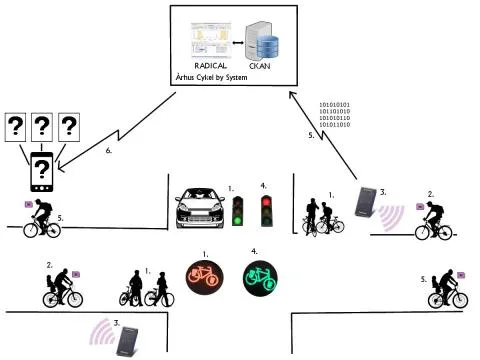This Danish City is Giving Bikers the Green Light
In a pilot program underway in Aarhus, Denmark, cyclists are given RFID tags that trigger traffic lights in their favor
/https://tf-cmsv2-smithsonianmag-media.s3.amazonaws.com/filer/eb/da/ebdaa0ab-85af-48b7-aea3-5d69d9c12079/dsc_0037.jpg)
If you’re a cyclist in Aarhus, Denmark, you might soon be able to pedal from home to work or school in the morning without stopping at a single red light.
As part of a pilot program to encourage biking, the city has engineered a popular intersection to be responsive to bikers. Riders carrying an RFID tag that triggers a sensor, turning the light green in their favor. By making the streets more bike friendly, city planners hope that they can cut car congestion and pollution.
The city's bike program has given 200 bikers the tags and installed the sensor at the very first intersection. Rita Westergaard, the business solutions manager at ID-Advice, the Danish company that built and installed the system, says they’re planning to have more sensors up and running at a couple of other intersections by the middle of 2016.
The RFID bike project is one facet of the EU’s RADICAL program, which is incorporating tech projects into city planning in five “smart cities” across Europe: Santander, Spain; Issy‐les‐Moulineaux, France; Athens, Greece; Genoa, Italy; and Aarhus. In Aarhus, the city government wanted to encourage biking, and they found that, second only to poor bike lanes, cyclists weren’t biking because they didn’t want to be stopping all the time. Planners wanted to find a way to give cyclists the right of way, to indicate that they were a priority.
“We know that if you have a lot of traffic lights in a short distance in the cycling lane then the cyclists are very confused, and they don’t want to stop all the time. It’s too difficult,” Westergaard says. “If I can go smoothly, I’m more likely to bike longer.”

The tag clips to the spokes of the cyclist’s front wheel, and when the rider passes the sensor, which is set back from the intersection, it triggers a response to flip the light in the bike lane to green, as long as there’s not cars already moving through the intersection. The idea is to give bikes priority.
The RFID tags are a relatively simple way to address the traffic flow problems. Many streets have magnetic sensors under the pavement in advance of an intersection; when a car rolls over them, the streetlight turns. But, Westergaard says, bikes don’t have enough metal in them to trigger the magnets. RFID tags, which easily attach to bike wheels and don’t require any kind of charging or added input from the rider, make a lot of sense. The trash can-size sensors are also relatively easy to install and don’t require ripping up the pavement.
According to Westergaard, the first trial, which started in April and is just concluding, has been relatively successful. The riders are reportedly happy, and there haven't been any incidents of lights changing at the wrong time, accidents or confusion. There hasn't been any pushback from drivers either, says Westergaard. The only hurdles the organizers encountered had to do with the way the system was built. The sensors were hard to service and access, and the RFID tags, which weren’t explicitly designed for bikes, were somewhat bulky and awkward.
“We think all the electronic components are there. They work as they should," says Westergaard. "It’s more a design issue.”
ID-Advice will be improving the system and implementing it in another intersection in Aarhus, to be up and running in the second quarter of 2016.
The concept could be incorporated in a lot of different cities, says Westergaard. ID-Advice has had interest from Lisbon, Portugal, and Athens, another of the RADICAL cities, and they’re currently targeting other places in Europe, the U.S. and Australia, where bike commuting and reducing inner-city traffic are priorities. In San Francisco, for instance, the city is looking at incorporating the “Idaho Stop” law, which lets cyclists yield and roll through stop signs instead of fully stopping.
Aarhus is trying to build up its bike culture. “We have a lot of cyclists in Denmark," Westergaard says. "If you want to look urban modern, you have a bike and you use it for transport."
/https://tf-cmsv2-smithsonianmag-media.s3.amazonaws.com/accounts/headshot/DSC_0196_2.JPG)
/https://tf-cmsv2-smithsonianmag-media.s3.amazonaws.com/accounts/headshot/DSC_0196_2.JPG)